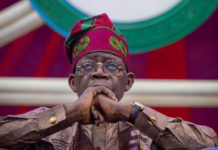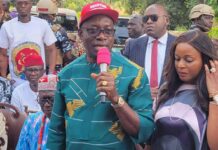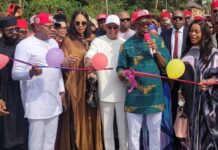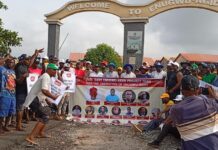A global legal defence group representing the detained leader of the Indigenous People of Biafra (IPOB), Mazi Nnamdi Kanu, has dismissed reports that he is responsible for the delay in his ongoing trial, insisting that the real cause lies in the Federal Government’s handling of the case and the court’s failure to rule on key legal motions.
The group, operating under the name Mazi Nnamdi Kanu Global Defence Consortium, made the claim in a statement signed by Njoku Jude Njoku, Esq., who said the public had been misled into believing that Kanu was frustrating his own trial.
According to the statement on Saturday, every day, there is “a false story that Kanu is ‘delaying’ his own trial. That story is a lie built on ignorance — and sometimes, deliberate mischief.”
The consortium explained that the key legal issue before the court is jurisdiction — that is, whether the Federal High Court has the power under law to try Kanu in the first place.
“Mazi Nnamdi Kanu is not running from trial; he is asking the court to first prove that it even has the legal power to try him. In law, that power is called jurisdiction. Without it, every step a judge takes is null and void,” the statement said.
The group argued that the charges filed against Kanu were defective because they were based on the Terrorism Prevention (Amendment) Act 2013, which had already been repealed and replaced by the Terrorism Prevention and Prohibition Act 2022
“You cannot prosecute anyone under a dead law — it is like using an expired currency note to buy something; it has no value. That is the heart of the jurisdictional motion that Justice Omotosho has refused to determine,” Njoku stated.
He further clarified that filing a motion to challenge a court’s jurisdiction is a constitutional right and cannot be considered a delay tactic.
“When a defendant files a motion asking the court to decide its jurisdiction, the law requires the court to hear and rule on it before doing anything else.
“If the motion is still pending, it is the court’s failure to decide it — not the defendant’s insistence on his rights — that causes delay,” the statement noted.
The group expressed concern over recent remarks attributed to Justice Omotosho, who was quoted as saying the court would “invoke appropriate provisions of the law” if Kanu continued on his current path.
According to the consortium, “Such statements, without legal clarity, only strengthen the impression that the court may punish a man for exercising his constitutional rights.
“The judge cannot skip jurisdiction and jump to trial, nor threaten sanctions against a defendant lawfully insisting on due process,” the legal consortium said.
Njoku also emphasized that the pace of court proceedings is determined solely by the presiding judge, not by the defendant.
“Every date of hearing is fixed by the judge. Every adjournment is granted by the judge. Every ruling is delivered by the judge. So, who truly controls the pace of the trial?” he asked.
The defence group faulted what it described as selective reporting by some media outlets that allegedly have exclusive access to courtroom proceedings while independent journalists are denied entry.
“They highlight every courtroom remark that sounds like a ‘warning’ to Kanu, but completely ignore the fact that his motion on jurisdiction remains unresolved,” the statement added.
“That is not journalism; it is state propaganda designed to prepare the public to accept injustice.”
The consortium said the real causes of delay in Kanu’s trial were the government’s actions, including the 2021 abduction and extraordinary rendition of Kanu from Kenya, the filing of defective charges, and the refusal to obey multiple court orders that discharged him and granted him medical access.
“None of these can be blamed on the defendant,” the statement read.
Citing constitutional and international legal provisions, the group maintained that Kanu’s right to challenge the competence of the court is guaranteed under Section 36(1) of the 1999 Constitution and Article 7(1)(a) of the African Charter on Human and Peoples’ Rights.
“By insisting that the court must prove its competence first, Kanu is upholding the Constitution — not violating it,” Njoku stressed.
The statement urged Nigerians to seek the truth rather than accept one-sided narratives about the trial.
“Those shouting ‘delay’ are either ignorant of the simplest principles of law or are deliberately serving propaganda,” Njoku said.
“The real question Nigerians should ask is simple: Who is really causing the delay — the man insisting that the law must be followed, or the judge refusing to follow it
“Justice cannot be built on threats, headlines, or propaganda. It must rest on law, truth, and courage,” the legal team stated.




